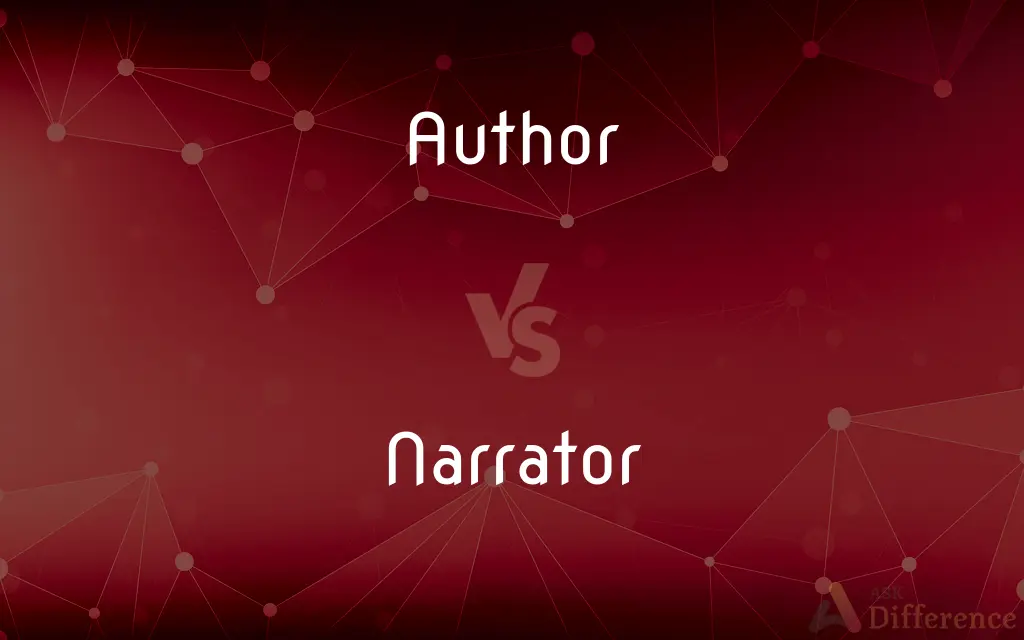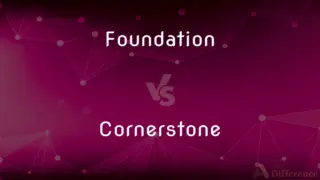Author vs. Narrator — What's the Difference?
By Urooj Arif & Fiza Rafique — Updated on April 3, 2024
An author creates the story; a narrator tells it. Authors are real people; narrators can be fictional.

Difference Between Author and Narrator
Table of Contents
ADVERTISEMENT
Key Differences
While the author is the source of creativity behind the story, the narrator is a tool or mechanism through which the story is told. Authors might choose a narrator based on how they want the story to be conveyed, selecting the point of view that best suits the narrative’s needs.
The distinction between author and narrator is crucial in literary analysis. It helps in understanding the perspective from which the story is told and in separating the author's personal opinions and life experiences from those depicted in the narrative. This differentiation is essential when discussing issues of reliability, bias, and perspective within the text.
Authors have the freedom to create narrators who are entirely different from themselves, enabling them to explore diverse perspectives and voices within their works. This creative choice allows authors to delve into characters, settings, and plots that might be far removed from their personal experiences.
While the author is the creator of the work, the narrator is the voice chosen by the author to tell the story. This voice can vary widely, from an omniscient observer of the entire world of the story to a specific character with limited knowledge and perspective.
Comparison Chart
Nature
Real person
Fictional voice within the story
ADVERTISEMENT
Role
Creates the story, characters, setting
Tells the story to the reader
Perspective
Outside the narrative
Within the narrative
Example of Function
J.K. Rowling writing "Harry Potter"
Harry's perspective in "Harry Potter"
Flexibility
Fixed identity
Can change perspective and knowledge
Compare with Definitions
Author
Responsible for content.
The author researched extensively for the historical novel.
Narrator
Storyteller within the text.
The narrator described the protagonist’s thoughts in detail.
Author
Unique style and voice.
The author’s distinct writing style captivates readers.
Narrator
Voice chosen by the author.
The narrator’s perspective added depth to the narrative.
Author
Creator of text.
The author wrote a compelling novel about adventure.
Narrator
May possess limited knowledge.
The narrator was unaware of the other characters' secrets.
Author
Outside the story.
The author’s biography provided insight into the themes of her books.
Narrator
Shapes reader’s understanding.
The narrator’s bias influenced how events were perceived.
Author
Real person.
The author discussed her writing process during the interview.
Narrator
Can be a character.
The narrator, also the hero of the story, shared his adventures.
Author
An author is the creator or originator of any written work such as a book or play, and is also considered a writer. More broadly defined, an author is "the person who originated or gave existence to anything" and whose authorship determines responsibility for what was created.
Narrator
A person who narrates, such as one who provides off-screen commentary in a documentary.
Author
The writer of a book, article, or other text.
Narrator
A character in literature, especially a novel or short story, who relates the plot and sometimes plays a role in the story.
Author
One who practices writing as a profession.
Narrator
A character in a fictional movie, play, or similar production who comments on what is happening, often through voice-over.
Author
One who writes or constructs an electronic document or system, such as a website.
Narrator
One who narrates or tells stories.
Author
An originator or creator, as of a theory or plan.
Narrator
(narratology) The person or the "voice" whose viewpoint is used in telling a story.
Author
Author God.
Narrator
The person providing the voice-over in a documentary.
Author
To write or be the author of (a published text).
Narrator
One who narrates; one who relates a series of events or transactions.
Author
To write or construct (an electronic document or system)
Authored the company's website.
Narrator
Someone who tells a story
Author
The originator or creator of a work, especially of a literary composition.
The copyright of any original writing belongs initially and properly to its author.
Have you read any Corinthian authors?
Author
Someone who writes books for a living.
Author
Principal.
Author
(obsolete) One's authority for something: an informant.
Author
To create a work as its author.
Author
The beginner, former, or first mover of anything; hence, the efficient cause of a thing; a creator; an originator.
Eternal King; thee, Author of all being.
Author
One who composes or writes a book; a composer, as distinguished from an editor, translator, or compiler.
The chief glory of every people arises from its authors.
Author
The editor of a periodical.
Author
An informant.
Author
To occasion; to originate.
Such an overthrow . . . I have authored.
Author
To tell; to say; to declare.
More of him I dare not author.
Author
Writes (books or stories or articles or the like) professionally (for pay)
Author
Someone who originates or causes or initiates something;
He was the generator of several complaints
Author
Be the author of;
She authored this play
Common Curiosities
Is the narrator always reliable?
Not necessarily. Narrators can be unreliable, intentionally or unintentionally misleading the reader.
Do all stories have narrators?
Yes, in one form or another, every story has a narrator through which the story is conveyed to the reader.
How does the choice of narrator affect a story?
It significantly influences the story’s perspective, tone, and the reader’s understanding of events and characters.
Can an author be a narrator?
Yes, but typically when authors narrate, they adopt a narratorial persona that fits the story's needs.
Can there be more than one narrator in a story?
Yes, multiple narrators can provide different perspectives and layers of complexity to the narrative.
What's the difference between a first-person and third-person narrator?
A first-person narrator is a character within the story, while a third-person narrator is an outside voice.
Can a narrator be completely objective?
Complete objectivity is challenging since every narration is influenced by the narrator’s perspective and knowledge.
Why would an author choose an unreliable narrator?
To add depth, complexity, and intrigue to the narrative, challenging readers to engage more critically with the text.
How do authors choose their narrators?
Based on the story they want to tell and the perspective they believe will best convey it to the reader.
How can identifying the narrator help in analyzing a text?
It aids in understanding the perspective, potential biases, and how the story is framed.
What role does a narrator play in storytelling?
The narrator shapes the reader's experience by controlling the flow of information and the lens through which the story is viewed.
Is the narrator's voice the same as the author's voice?
Not necessarily. Authors often create narrators with voices distinct from their own to serve the story.
How does the cultural background of an author influence narration?
It can shape the narrative perspective, themes, and the authenticity of the story’s setting and characters.
Can the narrator's reliability change throughout the story?
Yes, a narrator's reliability can evolve as the story unfolds, affecting the reader's perception of the truth.
What is the impact of narration on the reader's empathy for characters?
The narrator’s portrayal of characters can significantly influence the reader’s sympathy and understanding of those characters.
Share Your Discovery

Previous Comparison
Queendom vs. Kingdom
Next Comparison
Foundation vs. CornerstoneAuthor Spotlight
Written by
Urooj ArifUrooj is a skilled content writer at Ask Difference, known for her exceptional ability to simplify complex topics into engaging and informative content. With a passion for research and a flair for clear, concise writing, she consistently delivers articles that resonate with our diverse audience.
Co-written by
Fiza RafiqueFiza Rafique is a skilled content writer at AskDifference.com, where she meticulously refines and enhances written pieces. Drawing from her vast editorial expertise, Fiza ensures clarity, accuracy, and precision in every article. Passionate about language, she continually seeks to elevate the quality of content for readers worldwide.













































